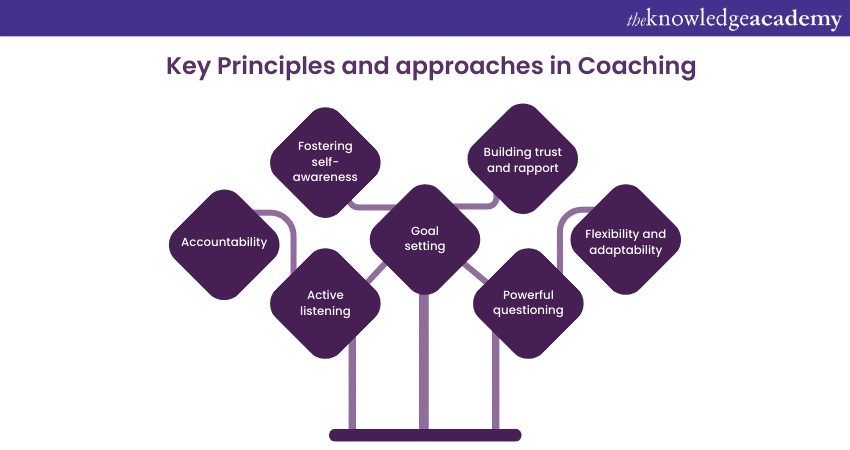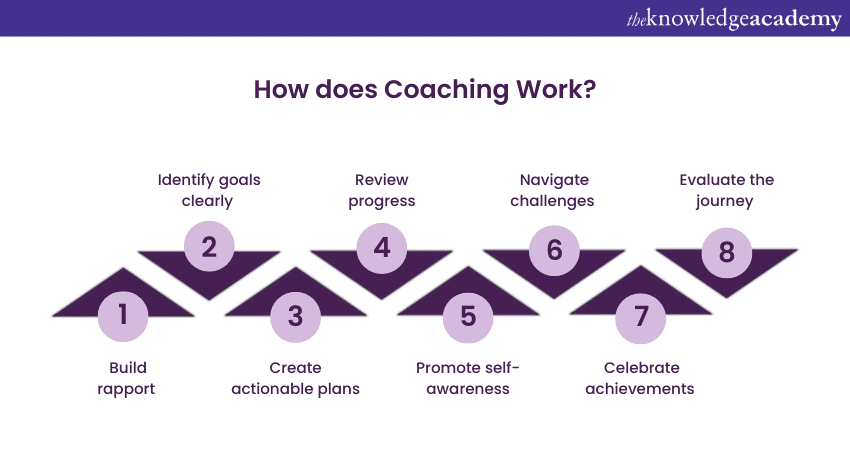We may not have the course you’re looking for. If you enquire or give us a call on 01344203999 and speak to our training experts, we may still be able to help with your training requirements.
Training Outcomes Within Your Budget!
We ensure quality, budget-alignment, and timely delivery by our expert instructors.

Coaching is a powerful practice that involves a collaborative partnership of a Coach and a learner. It focuses on achieving specific goals and unlocking personal and professional potential thus, Understanding. What is Coaching can greatly benefit individuals seeking growth and development.
In this blog, you will learn more about What is coaching along with its principles, types and Process. Learn how to find right coach to help you reach your goals.
Table of Contents
1) What is Coaching definition?
2) Key principles and approaches in Coaching
3) Different types of Coaching
4) Benefits of Coaching
5) How does Coaching work?
6) Coaching vs Counselling
7) Conclusion
What is Coaching definition?
Coaching can be defined as a systematic and individualised approach that aims to enhance performance, facilitate learning, and unlock potential. It is a supportive process that empowers individuals to overcome challenges, build new skills, and achieve their desired goals.
Coaching encompasses a broad spectrum of activities, from personal development to professional growth. It helps individuals to navigate obstacles, identify strengths, and reach their full potential. Here's how it does that:
1) Providing guidance
2) Providing encouragement
Key principles and approaches in Coaching
Coaching is guided by certain key principles and approaches that shape its effectiveness. Coaching principles create a foundation for Coaches to facilitate growth and help clients achieve their desired outcomes. Let's explore some of the key principles and approaches of Coaching:

1) Active listening: Coaches practice active listening, paying close attention to the client's words, tone, and body language. This creates a safe space for individuals to explore their thoughts and feelings.
2) Powerful questioning: Coaches use open-ended questions to encourage reflection, challenge assumptions, and stimulate insights and solutions.
3) Goal setting: Coaches work collaboratively with clients to set up clear and measurable goals that align with their values. They support clients in defining action steps and timelines for goal achievement.
4) Accountability: Coaches promote accountability by helping clients track progress and reflect on their actions. This empowers clients to take ownership of their development.
5) Promoting self-awareness: Coaches guide clients in exploring their values, strengths, beliefs, and behaviour patterns. This increased self-awareness enables clients to make conscious choices and overcome obstacles.
6) Building trust and rapport: Coaches establish a safe and non-judgemental space where clients feel comfortable expressing themselves openly. This promotes a collaborative Coaching dynamic.
7) Flexibility and adaptability: Coaches adjust their approach to meet the needs of each client, ensuring Coaching sessions are tailored and relevant.
By embracing these key principles and approaches, Coaches empower clients to unlock their potential and achieve their goals.
Different types of Coaching
Coaching encompasses various specialities and niches, catering to diverse needs and objectives. Let's explore some of the common types of Coaching:
1) Executive Coaching: Executive Coaching focuses on developing leadership skills and enhancing performance in the workplace. It supports executives, managers, and leaders in achieving their professional goals and maximising their potential.
2) Life Coaching: Life Coaching helps individuals gain clarity and create meaningful lives. Coaches assist clients in various aspects, including personal growth, relationships, career transitions, and work-life balance.
3) Career Coaching: Career Coaching is aimed at individuals seeking guidance in their career paths. It assists in clarifying career goals, exploring new opportunities, and developing strategies for career advancement and fulfilment.
4) Performance Coaching: Performance Coaching aims to enhance performance and productivity in specific areas, such as sports, business, or creative pursuits. It helps individuals overcome obstacles, improve skills, and achieve peak performance.
5) Wellness Coaching: Wellness Coaching focuses on holistic well-being, including physical, mental, and emotional health. Coaches support clients in setting and achieving wellness goals, adopting healthy habits, and maintaining balance.
6) Business Coaching: Business Coaching is tailored for entrepreneurs and small business owners. It assists in business development, strategy, problem-solving, and achieving growth and profitability.
7) Leadership Coaching: Leadership Coaching helps individuals develop effective leadership skills and behaviours. By using this type of Coaching, leaders can inspire and motivate their teams, fostering collaboration, and achieving organisational goals.
8) Team Coaching: Team Coaching focuses on enhancing team dynamics, collaboration, and performance. Coaches facilitate communication, conflict resolution, and goal alignment within teams.
9) Health Coaching: Health Coaching aims to improve overall health and well-being. It supports clients in making positive lifestyle changes, managing chronic conditions, and achieving optimal physical and mental health.
These are just a few examples of the different types of Coaching available. Each type caters to specific needs and objectives, providing individuals with specialised support and guidance.
Disseminate knowledge and sharpen your active listening skills by signing up for our Train the Trainer Course now!
Benefits of Coaching
Coaching offers a multitude of benefits for individuals seeking personal and professional growth. Let's explore some of the key advantages of Coaching:
1) Clarity and focus: Coaching helps individuals gain clarity about their goals, values, and aspirations. Through deep exploration and powerful questioning, Coaches assist clients in identifying what truly matters to them. This clarity allows clients to focus their energy and efforts on what is most important, leading to greater fulfilment and purpose.
2) Motivation and accountability: Coaching provides clients with motivation and accountability. Coaches support and encourage clients to stay committed to their goals, providing guidance, feedback, and tools for self-assessment. This accountability ensures that clients follow through with their intentions and take consistent action towards their desired outcomes.
3) Overcoming limiting beliefs: Coaching helps individuals overcome limiting negative beliefs and self-imposed barriers. Coaches challenge clients' negative thought patterns and assist them in reframing their perspectives. By shifting limiting beliefs into empowering ones, clients can unlock their potential and achieve what was once thought impossible.
4) Improved performance: Coaching enhances performance by providing individuals with the tools, strategies, and support to excel in their endeavours. Coaches help clients identify and leverage their strengths, develop new skills, and overcome obstacles. This leads to improved performance and increased effectiveness in both personal and professional domains.
5) Enhanced self-awareness: Coaching promotes self-awareness, enabling individuals to understand their thoughts, emotions, and behaviours better. Through reflection and exploration, clients gain insights into their strengths, values, and areas for growth. This heightened self-awareness allows clients to make conscious choices aligned with their authentic selves.
Coaching empowers individuals to unlock their potential, achieve their goals, and live more fulfilling lives.
Get familiarised with effective coaching by signing up for our Coaching Skills Course now!
How does Coaching work?
The Coaching Process follows a structured framework that guides the Coach-client relationship. Let's explore the step-by-step journey of how Coaching works :

Step 1: Establishing rapport
The Coaching Process begins with building a strong rapport between the Coach and the client. Coaches create a safe and trusting environment where clients feel comfortable expressing themselves openly. Establishing rapport sets the foundation for an effective Coaching relationship.
Step 2: Clarifying goals and objectives
In this step, Coaches work with clients to clarify their goals and objectives. Through deep exploration and powerful questioning, Coaches assist clients in identifying what they want to achieve and why it matters to them. Clear goals provide a Well-Defined roadmap for the Coaching journey.
Step 3: Creating action plans
Once the goals are established, Coaches help clients create actionable plans. Coaches assist clients in breaking down their goals into specific tasks, setting timelines, and identifying resources and support needed. Action plans provide a structured approach to achieving desired outcomes.
Step 4: Taking action and accountability
In this stage of the Coaching Process, clients begin acting towards their goals. Coaches support clients in staying accountable and taking consistent steps forward. Regular check-ins and progress reviews help clients stay on track and customise their strategies as needed.
Step 5: Reflection and learning
Throughout the Coaching Process, Coaches encourage clients to reflect on their actions, experiences, and insights. Reflection promotes self-awareness and deepens the learning process. Coaches facilitate this reflection by asking thought-provoking questions and guiding clients in exploring their thoughts and emotions.
Step 6: Overcoming obstacles
Obstacles and challenges are inevitable on the path to achieving goals. Coaches help clients identify and overcome obstacles by exploring alternative perspectives, reframing limiting beliefs, and developing strategies for success. In this stage of the Coaching Process, Coaches provide support, encouragement, and tools to navigate challenges effectively.
Step 7: Celebrating milestones
As clients make progress towards their goals, Coaches celebrate milestones and achievements. Recognising and celebrating successes boosts clients' confidence and motivation. Coaches acknowledge clients' efforts and reinforce their belief in their abilities.
Step 8: Evaluation and closure
In the final step, Coaches and clients evaluate the Coaching journey and the progress made. Coaches help clients assess their growth, identify lessons learned, and celebrate the overall transformation. Closure involves reflecting on the Coaching experience, expressing gratitude, and setting intentions for the future.
The Coaching Process is dynamic and iterative, adapting to the unique needs of each client. It is a collaborative journey that empowers individuals to unlock their potential and achieve desired outcomes.
Ready to level up your skills and unlock your full potential? Enroll now in our Mentoring Training Course and embark on a transformative learning journey!
Coaching vs Counselling
Coaching vs Counselling presents a distinction between two valuable forms of support. Coaching primarily focuses on personal and professional development, aiming to set and achieve goals through guidance and skill-building. It empowers individuals to identify strengths and weaknesses, fostering self-improvement.
On the other hand, Counselling delves into emotional well-being and mental health concerns. It provides a safe space for exploring and addressing past traumas, emotional struggles, and psychological issues. Counsellors offer empathy, listening, and therapeutic techniques to help individuals cope with and overcome emotional challenges. Here's how the two approaches differ:
|
Aspect |
Coaching |
Counselling |
|
Focus |
Personal and professional development, goal setting, and achievement |
Emotional well-being, mental health, emotional struggles |
|
Purpose |
Achieving specific goals, enhancing skills and performance |
Addressing past traumas, emotional issues, and psychological challenges |
|
Approach |
Guidance, skill-building, motivation |
Empathy, listening, therapeutic techniques |
|
Timeframe |
Short to medium-term, goal-oriented |
Variable, often longer-term, process-oriented |
|
Client's Role |
Active participant sets and works towards goals |
Active participant explores emotions and experiences |
|
Outcome |
Enhanced performance, personal growth |
Emotional healing, improved mental health |
|
Typical Practitioner |
Coach |
Counsellor |
Conclusion
We hope you read and understand everything about What is Coaching. Coaching is a transformative practice that empowers individuals to achieve their ambitions and live fulfilling lives. Through a collaborative process, Coaching provides support, guidance, and accountability, helping clients unlock their potential and make meaningful changes. Hope we could answer all your queries about What is Coaching with this blog!
Ready to enhance your leadership skills? Enroll in our Coaching and Mentoring Training Course today!
Frequently Asked Questions
Upcoming Business Skills Resources Batches & Dates
Date
 Train the Trainer
Train the Trainer
Fri 10th May 2024
Fri 14th Jun 2024
Fri 12th Jul 2024
Fri 9th Aug 2024
Fri 13th Sep 2024
Fri 11th Oct 2024
Fri 8th Nov 2024
Fri 13th Dec 2024







 Top Rated Course
Top Rated Course



 If you wish to make any changes to your course, please
If you wish to make any changes to your course, please


